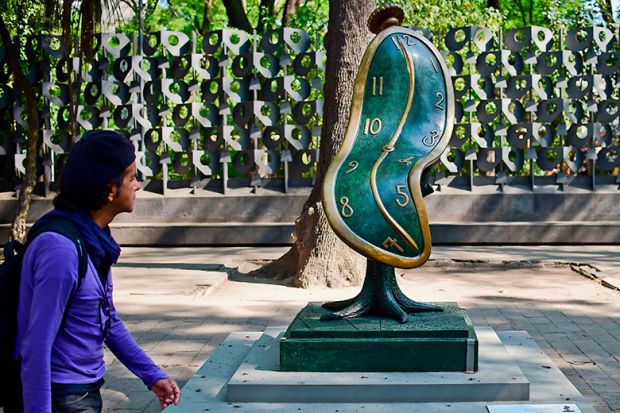Leaders of Europe’s top doctoral association are using their main conference to call for more “realistic” expectations about the time required to complete a PhD, saying the funding provided is often not enough to cover the completion of a doctorate.
As the annual meeting of the European University Association’s (EUA’s) Council for Doctoral Education got under way in Manchester on 22 June, the organisation published a new strategy that notes that while completing a doctorate typically takes “four years or more” in most European countries, “funding is often limited to three years”.
“Duration of funding should be based on a realistic assumption of the duration of a doctorate,” the strategy says.
Although the strategy cautions that an increase in funding “should not…be at the expense of the availability of doctoral positions”, Alexander Hasgall, the head of the Council for Doctoral Education, told Times Higher Education that a PhD was “no longer just about doing or writing research – it is, in many cases, about teaching, communication of results, collaborating with industry and preparing for diverse careers outside academia”.
“Doctoral funding cannot last forever, but we know research takes time, as does the additional training that is now part of a modern doctorate,” he said.
While the EUA’s Salzburg Principles on doctoral education state that PhD programmes should last “three to four years full-time as a rule”, a 2019 survey of universities by the organisation found that only 51 per cent said doctoral students who did complete typically did so within this duration. More than a quarter said the average completion time was five years or longer.
Luke Georghiou, deputy vice-chancellor of the University of Manchester and chair of the council’s steering committee, said there was increasing concern about the availability of funding during the latter stages of a PhD.
“As people reach the crucial writing-up phase, they often run off the end of their funding and begin to struggle at exactly the point they need help,” said Professor Georghiou.
Without sufficient attention to this problem, universities could find it increasingly hard to recruit high-calibre PhD students, he predicted. “There is a problem looming – in most countries, there is a tradition of people accepting low incomes while they do their doctorates, but there is a limit to what they will take,” he said.
The EUA stops short of recommending that a typical PhD should be funded for at least four years, although several funders have already moved in this direction. Last year, the UK’s Economic and Social Research Council said it would extend its funding to last three and a half years, although it said it would have to reduce the number of students it subsidises by a 10th to accommodate this. The Engineering and Physical Sciences Council already provides four years of funding for many programmes.
Carolyn Wynne, director of Coventry University’s doctoral college and co-author of a report into UK doctoral funding that was published in January, said completing a doctorate within three years was a “tall order”, but she was wary of moving to a “one-size-fits-all” model based on four years of funding.
“It’s very much an equity issue. There will always be a finite amount for PhD studentships, and if you move to a four-year model, you will be increasing the amount given to those that already have funding,” said Ms Wynne, whose survey of UK institutions found that 36 per cent put the average length of full-time PhD study at four years, with 4 per cent stating it typically took five years.
However, the upward drift in PhD duration was not inevitable, she added, stating that investments in supervisor training might now be helping researchers to complete more quickly. According to her survey of UK institutions, 85 per cent claimed that the average time for students to complete a PhD had either fallen or stayed the same compared with 10 years ago. “We need to look beyond this question of three- or four-year programmes,” she said.
Register to continue
Why register?
- Registration is free and only takes a moment
- Once registered, you can read 3 articles a month
- Sign up for our newsletter
Subscribe
Or subscribe for unlimited access to:
- Unlimited access to news, views, insights & reviews
- Digital editions
- Digital access to THE’s university and college rankings analysis
Already registered or a current subscriber? Login










